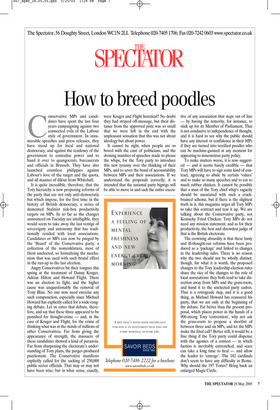How to breed poodles
Conservative MPs and candidates have spent the last four years campaigning against two connected evils of the Labour style of government. In innumerable speeches and press releases, they have stood up for local and national democracy, and against the tendency of the government to centralise power and to hand it over to quangocrats, bureaucrats and officials in Brussels. They have also launched countless philippics against Labour’s love of the target and the quota, and all manner of diktat from Whitehall.
It is quite incredible, therefore, that the Tory hierarchy is now proposing reforms of the party that are not only anti-democratic but which impose, for the first time in the history of British democracy, a series of demented Stalinist tick-box productivity targets on MPs. In so far as the changes announced on Tuesday are intelligible, they would seem to take away the last vestige of sovereignty and autonomy that has traditionally resided with local associations. Candidates or MPs can now be purged by the ‘Board’ of the Conservative party, a collection of the nomenklatura, most of them unelected, so formalising the mechanism that was used with such brutal effect in the run-up to the last election.
Angry Conservatives bit their tongues this spring at the treatment of Danny Kruger, Adrian Hilton and Howard Flight. There was an election to fight, and the higher cause was unquestionably the removal of Tony Blair. No one now need exercise any such compunction, especially since Michael Howard has explicitly called for a wide-ranging debate. Let us enter that debate, therefore, and say that these three appeared to be punished for thought-crime — and, in the case of Kruger and Flight, for the crime of thinking what was in the minds of millions of other Conservatives. Far from giving the appearance of strength, the massacre of these candidates showed a kind of paranoia. Far from sharpening the electorate’s understanding of Tory plans, the purges produced puzzlement. The Conservative manifesto explicitly called for the sacking of 250,000 public sector officials. That may or may not have been wise; but in what sense, exactly, were Kruger and Flight heretical? No doubt they had strayed off-message, but their distance from the approved piste was so small that we were left in the end with the unpleasant sensation that this was not about ideology but about power.
It cannot be right, when people are so bored with the cant of politicians, and the droning inanities of speeches made to please the whips, for the Tory party to introduce this new tyranny over the thinking of their MPs, and to sever the bond of accountability between MPs and their associations. If we understand the proposals correctly, it is intended that the national party bigwigs will be able to move in and sack the entire execu tive of any association that steps out of line — by having the temerity, for instance, to stick up for its Member of Parliament. That is not conducive to independence of thought, and it is hard to see why the public should have any interest or confidence in their MPs if they are turned into terrified poodles who can be machine-gunned at any moment for appearing to misconstrue party policy.
To make matters worse, it is now suggested — and it seems barely credible — that Tory MPs will have to sign some kind of contract, agreeing to abide by certain ‘values’ and to make so many speeches and to eat so much rubber chicken. It cannot be possible that a man of the Tory chief whip’s sagacity should be associated with such a crackbrained scheme, but if there is the slightest truth in it, this magazine urges all Tory MPs to take this contract and tear it up. We are talking about the Conservative party, not Kentucky Fried Chicken. Tory MPs do not need any mission statement; and as for their productivity, the best and shrewdest judge of that is the British electorate.
The crowning absurdity is that these hasty and ill-thought-out reforms have been produced as a ‘package’ and linked to changes in the leadership rules. There is no reason why the two should not be wholly distinct; though, for what it is worth, the proposed changes to the Tory leadership election rules share the vice of the changes to the role of local associations: they both tend to take discretion away from MPs and the grass-roots, and hand it to the unelected party cadres. That is a retrograde step, and it is a good thing, as Michael Howard has reassured his party, that we are only at the beginning of the debate. Far better than the present proposal, which places power in the hands of a 900-strong Tory ‘convention’, why not ask the grass-roots to propose a shortlist of between three and six MPs, and let the MPs make the final call? Better still, it would be a fine thing if the Tory party could dispense with the agonies of a contest — in which faction is inevitably entrenched, and scars can take a long time to heal — and allow the leader to ‘emerge’. The 182 cardinals don’t seem to have any difficulty in Rome. Why should the 197 Tories? Bring back an enlarged Magic Circle.






















































 Previous page
Previous page